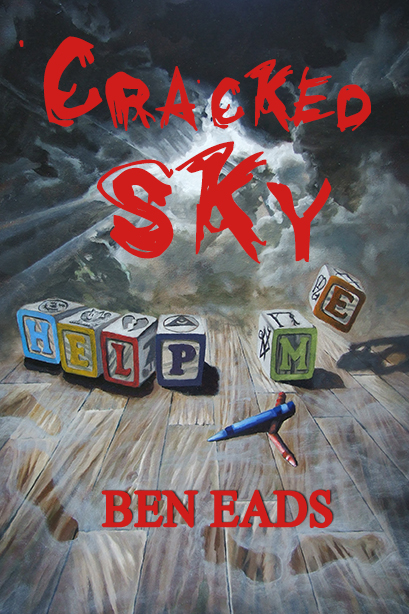Welcome to this week’s installment of The Scariest Part, a recurring feature in which authors, comic book writers, filmmakers, and game creators tell us what scares them in their latest works of horror, dark fantasy, dark science fiction, and suspense. (If you’d like to be featured on The Scariest Part, please review the guidelines here.)
My guest this week is Leanna Renee Hieber, whose latest novel is The Eterna Files. Here is the publisher’s description:
Welcome to The Eterna Files, written by Leanna Renee Hieber, “the brightest new star in literature” (True-Blood.net).
London, 1882: Queen Victoria appoints Harold Spire of the Metropolitan Police to Special Branch Division Omega. Omega is to secretly investigate paranormal and supernatural events and persons. Spire, a skeptic driven to protect the helpless and see justice done, is the perfect man to lead the department, which employs scholars and scientists, assassins and con men, and a traveling circus. Spire’s chief researcher is Rose Everhart, who believes fervently that there is more to the world than can be seen by mortal eyes.
Their first mission: find the Eterna Compound, which grants immortality. Catastrophe destroyed the hidden laboratory in New York City where Eterna was developed, but the Queen is convinced someone escaped — and has a sample of Eterna.
Also searching for Eterna is an American, Clara Templeton, who helped start the project after the assassination of Abraham Lincoln nearly destroyed her nation. Haunted by the ghost of her beloved, she is determined that the Eterna Compound — and the immortality it will convey — will be controlled by the United States, not Great Britain.
And now, let’s hear what the scariest part was for Leanna Renee Hieber:
For me as the author, I find the scariest part of The Eterna Files to be the scene where my heroine Clara Templeton deliberately puts herself into a situation where she knows she’s at certain risk of an epileptic seizure for the sake of her investigation.
When Clara, a Sensitive with empathic gifts and mediumship abilities, is put into close contact with too much negative paranormal energy, the over-stimulation to her sixth sense triggers a seizure. As this condition has been with her since her youth, she knows her body well enough to know there is a distinct countdown to get herself out of the offending situation before, one by one, her senses, then her body fail her. Like lights failing with no generator backup; a fall with no safety net. This countdown, when she’s placed herself in a relative house of horrors to investigate, was, for me, one of the most nerve-wracking scenarios I’ve ever written. Clara narrates this countdown for us as she tears about, seeing very dark clues in an abandoned disaster site. We count down to blackout with her.
I believe in order to write effective horror, the author has to tap into their own worst nightmares, and boy is this one of them.
I am very in tune with my body, health, and brain chemistry that I have to manage with expert care. I am personally leery of heavy medication, one might say I am a control-freak over my body’s systems and precautions. I’ve never done drugs as I don’t want to mess with that particular chemistry (wine and coffee don’t count, kids, come on). I am always striving to learn more about my own mental, spiritual and physiological connections to a healthy and balanced life. This scene is the equivalent of me knowing I’m going to trigger a panic attack in a dangerous place with no one to help find the way out. Slowly losing senses and consciousness, sinking into complete vulnerability in an unsafe setting: true horror.
It’s one thing for a character to be surprised by a horrific turn, it’s another to dwell in that rising, certain tide of dread. Building that tension and allowing myself to channel Clara, in empathy — this is where my being a professional actress as well is part and parcel of my writing process — is critical. While I don’t have Clara’s exact condition, I bring to the “role” as I write it that parallel understanding, making for a more visceral scene in the telling of it.
Good fantasy and horror, no matter how fantastical the setting, should always be rooted in some core truths.
I am thrilled that in working with Tor, grateful to have seven upcoming books in contract with them, I’ve the freedom for more horror genre elements to weave into the core of my Gaslamp Fantasy work. The world of The Eterna Files is a densely spooky haunted house I’m really enjoying exploring; opening doors I have no choice but to open, braced for infinite possibility. I have to be ready for anything, because I’ve a wild imagination and it really loves to confront me with fears and fascinations. I hope it will keep you up at night too.
Leanna Renee Hieber: Website / Twitter / Facebook
The Eterna Files: Amazon / Barnes & Noble / Powell’s / IndieBound / signed copies from WORD
Actress, playwright and author Leanna Renee Hieber is the award-winning, bestselling author of Gothic Victorian Fantasy novels for adults and teens. Her Strangely Beautiful saga won 3 Prism awards for excellence in the genre of Fantasy Romance, hit Barnes and Noble’s and Borders bestseller lists and garnered numerous regional genre awards. This series will reissue in new, revised editions from Tor and is being adapted into a musical theatre production. Leanna’s Magic Most Foul trilogy began with Darker Still, an Indie Next List pick and a Scholastic Book Club “Highly Recommended” title. Her short fiction appears on Tor.com and in anthologies such as Queen Victoria’s Book of Spells, Willful Impropriety and multiple “Mammoth Book” anthologies. Her fiction has been translated into numerous languages and selected for national book club editions. A proud member of performers unions Actors Equity and SAG-AFTRA, she works often in film and television on shows like Boardwalk Empire. A perky Goth girl with more corsets than is reasonable, Leanna lives in New York City with her husband and their beloved rescued lab rabbit.


![Pageflex Persona [document: PRS0000037_00020]](https://www.nicholaskaufmann.com/wp-content/uploads/2015/01/Lost-Level-cover-658x1024.jpg)


